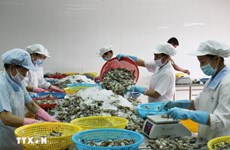Seed production a weak link
Though Vietnam is a leading exporter of farm produce, it produces very little of its seedlings.
Though Vietnam is a leading exporter of farm produce, it produces very little of its seedlings.
In the case of hybrid rice, for instance, it can meet a mere 20-25 percent of demand and the rest is imported from neighbouring countries, especially China , according to figures from the Plant Cultivation Department.
Following 20 years of research, the country has only four varieties of hybrid rice, with five others still being planted on a trial basis.
Some 80-85 percent of seeds required for major vegetables like tomato, cucumber, and beans and for high-quality grass for feeding livestock are also imported.
In the case of sugarcane, domestic supply met only about 10 percent of demand for seedlings, the Sugarcane Research and Development Centre said.
In 2006-10 the Ministry of Agriculture and Rural Development (MARD) approved 19 projects to produce seeds and seedlings.
Sixteen of them have been completed with 120 models established for producing various seedlings, including rice, corn, tea, and vegetables.
Deputy Minister of Agriculture and Rural Development Bui Ba Bong said the projects had cost 268 billion VND (12 million USD) but sales of seedlings produced through them had fetched only 16 billion VND.
The units carrying out the projects had not focused enough on producing seedlings for mass cultivation, he said.
Experts blamed the shortage of seeds on the country's failure to have long-term strategies and channel investment.
Tran Dinh Long, chairman of the Vietnam Seedling Association, said the Government should have a comprehensive long-term strategy to develop seedling production and identify some key crop varieties to develop brand names.
The Mekong Delta, the country's rice granary, for instance, can develop one to three high-quality rice strains, thus improving the quality of rice, he said.
Nguyen Tri Hoan, head of the Field Crops Research Institute, said for production of seedlings to be successful, cooperation with businesses is essential since research institutes themselves cannot produce seedlings for mass cultivation.
Nguyen Tri Ngoc of the Plant Cultivation Department said the country has done the task of researching to create new strains but not that of producing seedlings for cultivation.
This needs the participation of businesses, he said, echoing Hoan's opinion.
The Government has, under a decision to increase the output of seedlings in 2011-15, unveiled policies to support businesses involved in their production, including credit and land support, he added./.
In the case of hybrid rice, for instance, it can meet a mere 20-25 percent of demand and the rest is imported from neighbouring countries, especially China , according to figures from the Plant Cultivation Department.
Following 20 years of research, the country has only four varieties of hybrid rice, with five others still being planted on a trial basis.
Some 80-85 percent of seeds required for major vegetables like tomato, cucumber, and beans and for high-quality grass for feeding livestock are also imported.
In the case of sugarcane, domestic supply met only about 10 percent of demand for seedlings, the Sugarcane Research and Development Centre said.
In 2006-10 the Ministry of Agriculture and Rural Development (MARD) approved 19 projects to produce seeds and seedlings.
Sixteen of them have been completed with 120 models established for producing various seedlings, including rice, corn, tea, and vegetables.
Deputy Minister of Agriculture and Rural Development Bui Ba Bong said the projects had cost 268 billion VND (12 million USD) but sales of seedlings produced through them had fetched only 16 billion VND.
The units carrying out the projects had not focused enough on producing seedlings for mass cultivation, he said.
Experts blamed the shortage of seeds on the country's failure to have long-term strategies and channel investment.
Tran Dinh Long, chairman of the Vietnam Seedling Association, said the Government should have a comprehensive long-term strategy to develop seedling production and identify some key crop varieties to develop brand names.
The Mekong Delta, the country's rice granary, for instance, can develop one to three high-quality rice strains, thus improving the quality of rice, he said.
Nguyen Tri Hoan, head of the Field Crops Research Institute, said for production of seedlings to be successful, cooperation with businesses is essential since research institutes themselves cannot produce seedlings for mass cultivation.
Nguyen Tri Ngoc of the Plant Cultivation Department said the country has done the task of researching to create new strains but not that of producing seedlings for cultivation.
This needs the participation of businesses, he said, echoing Hoan's opinion.
The Government has, under a decision to increase the output of seedlings in 2011-15, unveiled policies to support businesses involved in their production, including credit and land support, he added./.












